In order to conduct business operations in a sound and ethical manner and fulfill its responsibilities to stakeholders, Pentel introduced its Basic Policy for the Establishment of Internal Control System in May 2015 to provide the guiding principles of our corporate governance.
This Policy was further revised in March 2017 following the establishment of the internal control regulations, which prescribe the design and operation of the Internal Control System.
An Internal Control Committee, consisting of the President, Directors, Corporate Auditors, and the Manager of the Corporate Strategy Division, was newly established as a supervisory body for internal control positioned above the Risk Management Committee.
As the highest organ of decision-making, the Board of Directors holds regular and extraordinary meetings, discusses and determines important matters concerning the management of the Group as part of duties performed by the Company’s Directors, in addition to holding weekly management meetings to facilitate the transmission of information by establishing a framework for Directors to share information and oversee the activities of other Directors.
The Board of Corporate Auditors, which consists of three members, including two outside corporate auditors, works with the independent auditor and the Audit Division to ensure early detection and correction of operational weaknesses and flaws and provide advice and recommendations for improved operations.
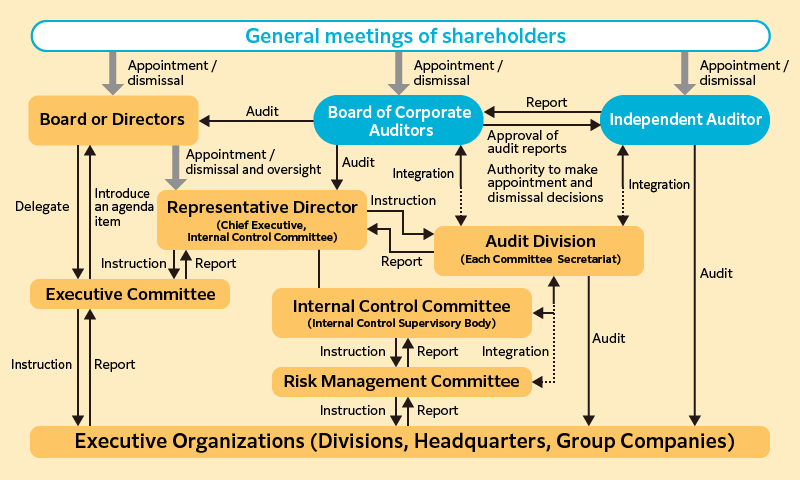
- 拡大
- Corporate governance system
As a global business operator, Pentel considers compliance to be a top priority. Furthermore, we define compliance in a broad sense to mean not only adhering to laws and regulations, but also strictly complying with accepted corporate and social ethical codes and our own internal rules, as well as national and local legislation and restrictions. We further espouse and promote compliance across the entire Group as a guiding principle for appropriate action. In addition, we formulated the Pentel Group Code of Conduct in 2015 and have communicated and enforced it to our affiliates all over the world.
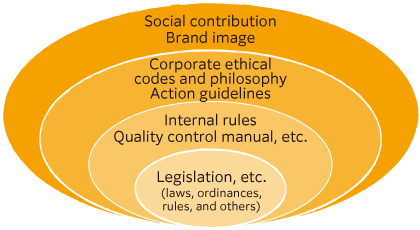
- 拡大
- Pentel’s concept of compliance
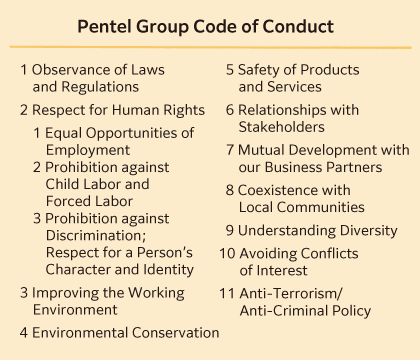
We purchase raw materials, parts, and products from our suppliers under the basic principle of fair trade at appropriate prices. To ensure this, we make constant efforts to identify the trends of relevant markets. In regards to trades with our overseas suppliers, we actually visit their manufacturing sites to ensure the timely procurement of high-quality goods from all over the world. In response to the environmental regulations, which have been growing tougher in recent years, we carefully select suppliers who comply with the regulations and maintain stable relationships with them. We will thus continue our efforts to ensure that our products will satisfy our customers.
At Pentel, we manage a wide variety of risks that may have significant impacts on our business by collecting internal risk information regularly and, in the event that such a risk develops into an incident, to minimize the damage and take immediate actions toward recovery. We see these actions as the most important management issues. In Japan, we have established a Crisis Management Team that is led by the President and CEO. To detect and address overseas risks at an early stage, we collect risk information from our overseas affiliates on an as-needed basis and have the relevant departments discuss each detected risk and provide instructions and information for handling it.
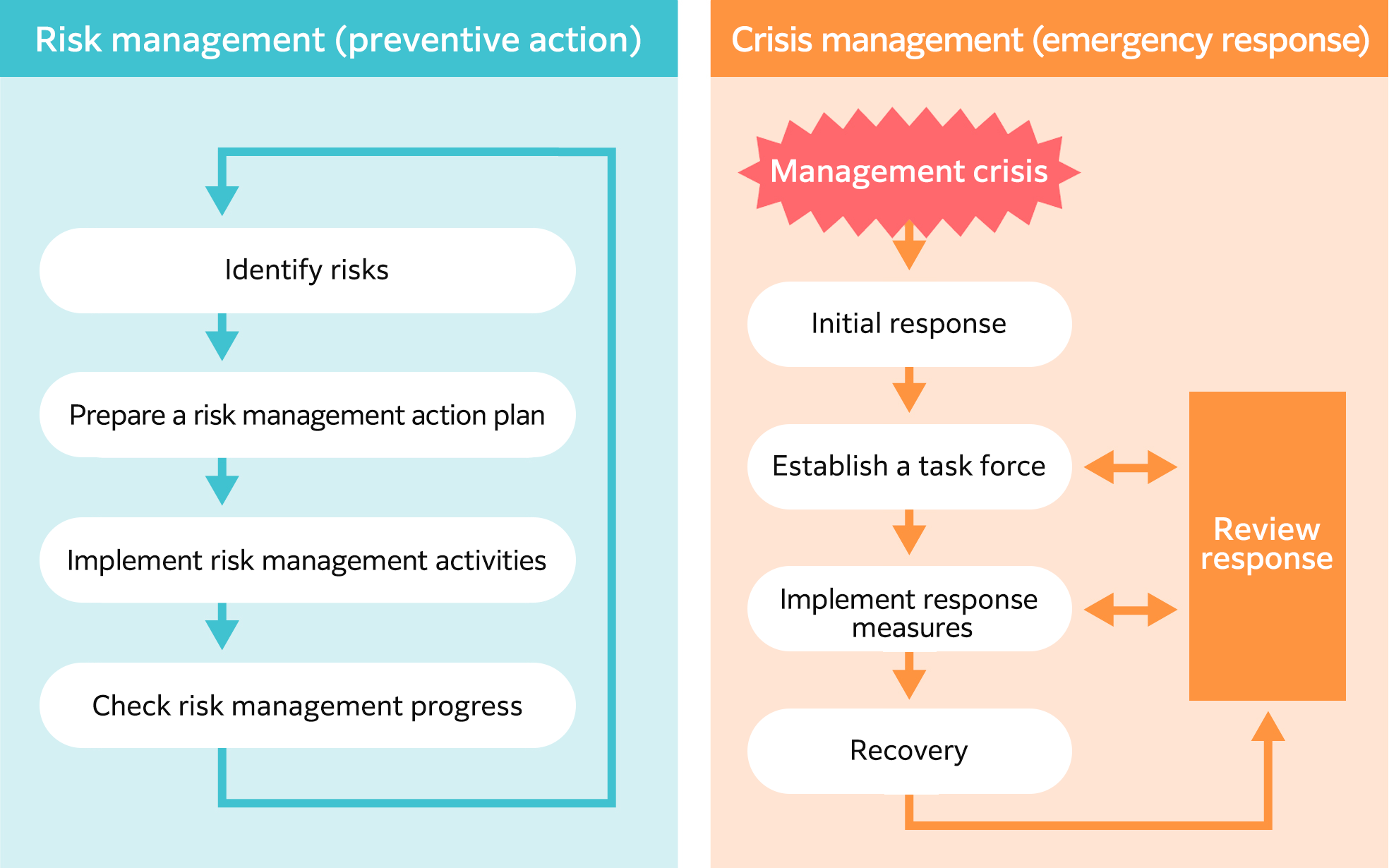
At Pentel, the Intellectual Property Department is in charge of the central management of the company’s intellectual property. The office also formulates and implements our intellectual property strategies in line with our research, development and product themes. We file patent applications pertaining to the achievements of our R&D efforts in a timely manner and apply for protection of peripheral rights to prevent imitations from appearing on the market. As it is our intention to respect the intellectual property of others, we conduct investigations regarding the related rights of other companies in every phase of our research and development activities. We have also filed trademarks applications and obtained trademark rights in more than 100 countries around the world. We take a firm stand against piracy and strive to protect our products and their related rights through the collaborative efforts of the Intellectual Property Management Office and our R&D departments, as well as with the cooperation of sales departments and overseas group companies.
We have made company-wide efforts to put business continuity plans (BCPs) in place and continually upgrade them to ensure full preparedness for possible contingencies.
Standards for addressing novel influenza strains and COVID-19 countermeasures were drawn up based on guidelines provided by the Ministry of Health, Labour and Welfare and the Ministry of Economy, Trade and Industry. These established a structure for business operations that prioritized safety assurance during the spread of infectious diseases, and introduced infection prevention measures for employees posted overseas.
Our three factories in Japan have their own crisis management manuals, which specify prevention measures and imperative emergency responses and procedures.
To prepare for a large-scale disaster such as a major earthquake, we have measures in preparation for a disaster such as a stockpile and an emergency contact network; and conducting a disaster drill simultaneously at all of our business locations every year using our safety confirmation system.
We also see new threats to information security constantly emerging. To address these threats and ensure efficient operations, we need to continue implementing the latest information security measures.
The Information System Division has established computer safety rules and continues to engage in activities for preventing the loss of our information assets and protecting them from accidents, disasters, crimes and other threats. The division also periodically transfers backup data to remote sites and stores it to prepare for computer system-related disasters, and conducts data recovery drills several times a year as information security training of employees.
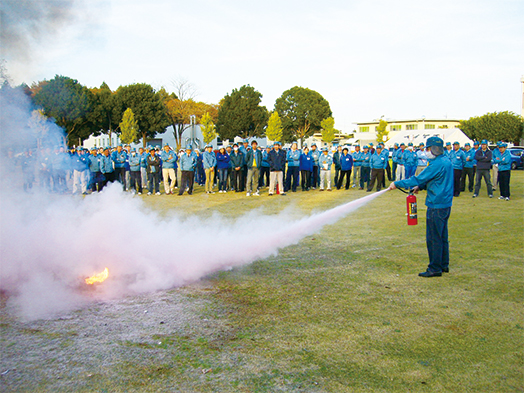
- 拡大
- Disaster drill (Ibaraki Factory)
